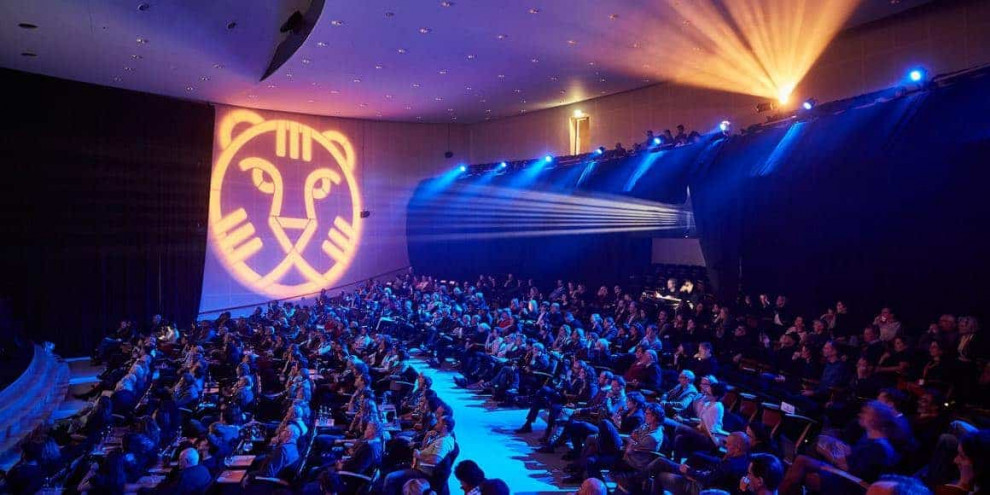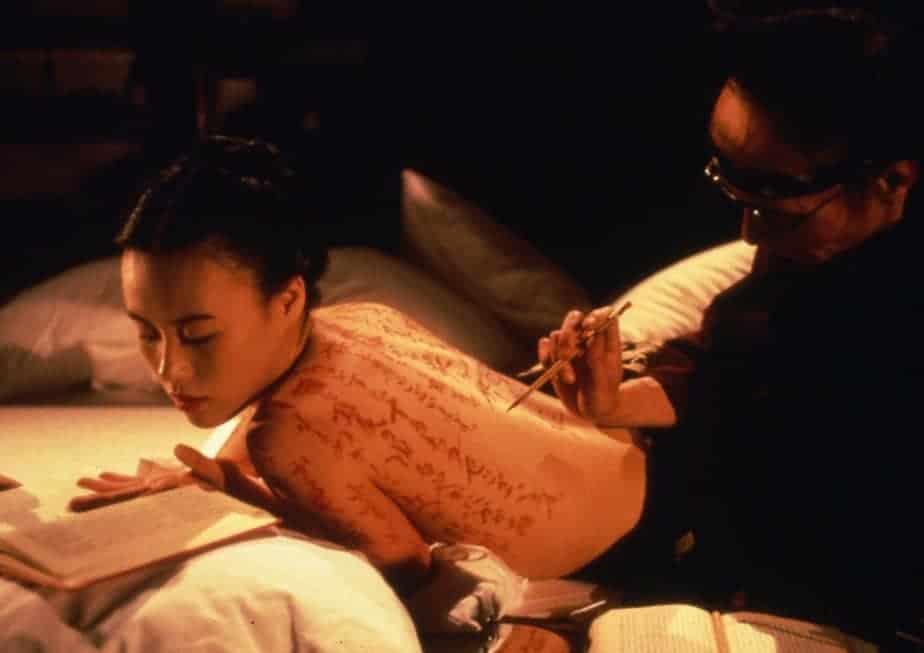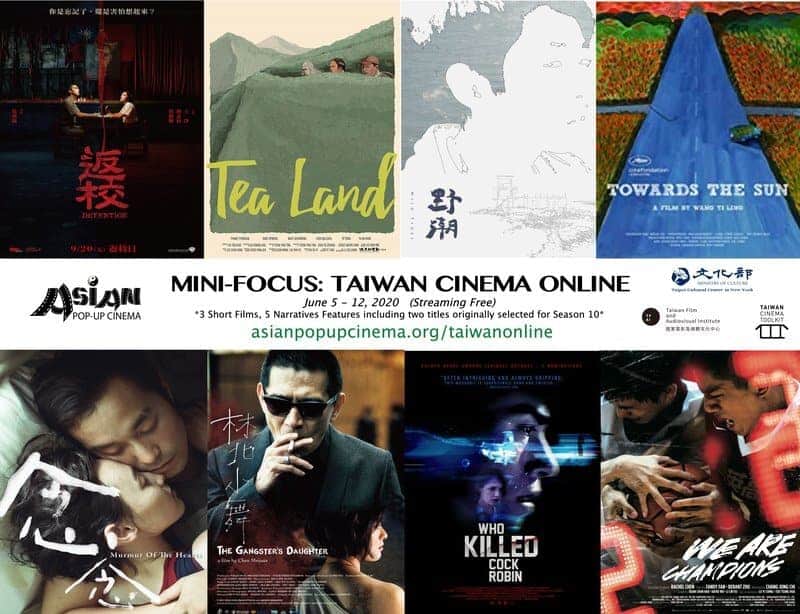The International Film Festival Rotterdam (IFFR) 2019 is around the corner (23rd January – 3rd February). Get ready for a high-quality line-up of carefully selected fiction and documentary feature films, short films and media art.
As always, the Asian film selection is rich and inviting. We have picked for you all the films from the Asian Continent.

IFFR comprises four Competition Sections and also an incredible number of Awards to encourage and help filmmakers:
Tiger Competition – An international jury chooses a winner from eight nominated films. Last year the prize was won by Chinese movie “The Widowed Witch” by Cai Chengjie.
Ammodo Tiger Short Competition – The power of short: films compete in the short film selection to three equivalent prizes.
Bright Future Competition – Filmmakers presenting the world or international premiere of their first feature length film in the main programme of IFFR's section Bright Future, are eligible for the Bright Future Award.
Big Screen Competition 2019 – An audience jury selects one IFFR-film which they believe deserves a spot on both the big screens of Dutch cinema as well television screens at home, as the winning film will also be broadcasted by VPRO on NPO 2. Pop Aye by Kirsten Tan won the 2017 edition of this competition.
Awards: BankGiro Loterij Audience Award – Hubert Bals Fund Audience Award – IFFR Youth Jury Award – FIPRESCI Award – NETPAC Award (Last year's winner was “Nervous Translation” by Shireen Seno) – KNF Award – New Voices Short Award – New Found Footage Award
CineMart Awards: ARTE International Prize (€6,000) – Eurimages Co-Production Development Award – Cinemart post-production Award – Dutch Post-production Awards
And here is the Asian line-up in alphabetical order.
FEATURE FILMS:

“About Him or How He Did Not Fear the Bear” by Nariné Mkrtchyan, Arsen Azatyan – Armenia (2019)
On 12 January 2015, a Russian soldier forces his way into the home of an Armenian family in the city of Gyumri. He kills all seven members of the family. After being arrested, the soldier remains stubbornly silent. The reconstruction of this gruesome event and the aftermath can also be seen as a metaphor for a political and ethical quest.

“Asako I & II” by Hamaguchi Ryūsuke – Japan, France (2018)
Two years after the love of her life disappeared without a trace, Asako falls in love with another man who looks identical to him, although his personality couldn't be more different. Calm everyday life and raging passions mix seamlessly in this study of love in all its complex contrariness.

“Ash Is Purest White” by Jia Zhangke – China, France (2018)
In Jia Zhangke's new film, dancer Qiao and mob boss Bin's violent relationship plays out against a background chronicling contemporary China from 2001 to 2017; from mining ghost towns to entire villages sacrificed for new dams.

“Bhonsle” by Devashish Makhija – India (2018)
In Maharashtra province, tensions between Marathi and Bihari communities are running high during the run-up to the annual feast honouring the god Ganesha. Former policeman Bhonsle looks on with resigned despair. When the young woman next door falls victim to the conflict, he feels compelled to make one last stand.

“BNK48: Girls Don't Cry” by Nawapol Thamrongrattanarit – Thailand (2018)
BNK48, the most popular girl band in Thailand, is all about cuteness. Through revealing interviews with some of the 50 band members, this documentary sketches the very different real lives of Thai superstars: reaching the top means competitiveness, stress and armies of social media followers.

“Cities of Last Things” by Ho Wi Ding – Taiwan, China, USA, France (2018)
In Cities of Last Things, Malaysian film director Ho Wi Ding, whose feature debut, Pinoy Sunday (2009), was also screened at IFFR, tells in three non-chronological parts spanning three decades how a man came to his desperate act. The dystopian colours splash from the screen, the editing is brutal, the tone deceptively light.

“Dog Days” by Timmy Harn – Philippines (2018)
Crystal meth and blood magic mix in this intoxicating underground basketball drama. Michael Jordan Ulili is a Filipino basketball prospect destined for greatness, but his social class, racist teammates and bad knee try to block him from reaching the heights of his blood-fated capabilities. When hoop dream becomes fever dream, will he hit the winner?

“Domains” by Kusano Natsuka – Japan (2019)
Aki and Naoko are childhood friends who are drifting apart as adults. The familiar plot is told in an unexpected way: through actors line-readings. The suffocation of role patterns in friendship and family are conveyed through repeated lines that are occasionally dislodged to show that life can take unexpected turns.

“End of Season” by Elmar Imanov – Germany, Azerbaijan, Georgia (2019)
Three members of an Azerbaijani family long for freedom. 18-year-old Machmud wants his own home; mother Fidan wants her life back after years of service to the family; father Samir just wants to be left alone. However, freedom can also hide incomprehension and alienation. An astute family drama.

“The Garden Apartment” by Ishihara Umi – Japan (2018)
Artist and fashion photographer Ishihara Umi, also know as UMMMI, soaks the frame with melancholia as her characters drive into the night with no destination in sight for her effortlessly cool debut feature that explores the limbo state of becoming an adult.

“The Gold-Laden Sheep & the Sacred Mountain” by Ridham Janve – India (2018)
An old shepherd in the Himalayas goes looking for a crashed plane in the hope of finding gold. The place of the accident is, however, a holy mountain and his impure intentions do not go unpunished. His herd falls prey to predators, and he is beset by delusions, doubts and fear.]

“The Harvest” by Misho Antadze, Natia Guliashvili – Georgia (2019)
Initially conceived as a project to explore the cryptocurrency gold rush in the rural region of Kakheti in Georgia, this strictly observational essay proved to be equally as much an exploration of the relationship between nature, technology, and the changing landscape.

“House of My Fathers” by Suba Sivakumaran – Sri Lanka (2018)
The conflict between two villages symbolises the civil war in Sri Lanka, which ended in 2009. A man and a woman from each camp are sacrificed to lift a fertility curse. The fears and traumas of the war lurk in the woods. A highly relevant magic realist fairy tale with an acerbic undertone.

“Inner Landscape” by Frank Scheffer – Netherlands, China (2019)
Painstaking documentary about the creation of the chamber opera Si Fan (‘yearnings of love'), composed in 2015 for the Nieuw Ensemble by Guo Wenjing, one of China's most famous contemporary composers. Second part of Frank Scheffer's tetralogy on the disappearance of musical traditions in an era of modernisation and globalisation.

“Killing” by Tsukamoto Shinya – Japan (2018)
Shot in uncomfortable proximity and with a muted colour scheme, Tsukamoto Shinya's darkly violent take on the samurai (chambara) genre asks us to consider the weight of each kill. A skilled young samurai is recruited for a mission by a ronin, played by Tsukamoto himself, but hesitates in the face of murder.

“A Land Imagined” by Yeo Siew Hua – Singapore, France, Netherlands (2018)
On the fringes of Singapore, anonymous migrants work on an expanding global city. But even though they are building this new world, for its inhabitants they are invisible. What happens when one of them doesn't turn up to work anymore? In this stylish noir, an insomniac detective is put on the case. Golden Leopard winner in Locarno.

“Last Night I Saw You Smiling” by Kavich Neang – Cambodia, France (2019)
Filmmaker Kavich Neang grew up in the White Building, a famous apartment complex in Phnom Penh. Now demolition forces the inhabitants, including his parents, to leave. It was also evacuated under the Khmer Rouge, someone remarks. These are days filled with worries, emotions and memories. A sad love song expresses their feelings.

“The Lighthouse” by Maria Saakyan – Russia, Armenia (2006)
This newly restored debut film shows the war in the Caucasus – without war footage. Its talented director passed away a year ago, leaving behind a visually stunning and deeply affecting film that interweaves personal and social history to evoke a turbulent period in the history of this troubled region.

“Long Day's Journey Into Night” by Bi Gan – China, France (2018)
Young Chinese director Bi Gan's second film lives up to the standard set by his debut, Kaili Blues. He uses every cinematic technique in the book for his dream-like tale of Luo Hongwu's search for a past lover, which seamlessly merges with the summer they spent together 20 years ago.

“Maggie” by Yi Okseop – South Korea (2018)
Who are the intimate couple in a mysterious X-ray? A nurse accuses herself and her boyfriend, after which the South Korean Maggie becomes an episodic tale of confidence and faith. A refreshing, confounding, idiosyncratic debut, including a talking catfish and sinkholes that can swallow up three vans.

“Manta Ray” by Phuttiphong Aroonpheng – Thailand, France, China (2018)
Many Rohingya who flee Myanmar suffer untimely deaths along Thailand's coast. A Thai fisherman cares for a wounded man he finds in a coastal woodland where secretive things occur. Reality and magic, poetry and an exceptional friendship in this story with a grim, moving undertone.

“Memento Stella” by Makino Takashi – Japan, Hong Kong (2018)
Makino Takashi overwhelms us with his universe, made up of countless images in which we can lose ourselves, allowing us to compose our own stories, based on what we know of the world. Every viewer comes away with a unique work which resonates long afterwards.

“Memories of My Body” by Garin Nugroho – Indonesia (2018)
A sensitive Javanese boy explores his sexual identity through a dance company where male and female merge in a sensual way. In the wider world around him he sees only violence and intolerance. A poetic-realistic coming-of-age story, based on the life of dancer Rianto.

“Nona. If They Soak Me, I'll Burn Them” – Chile, Brazil, France, South Korea (2019)
The Chilean coastal town where Nona (66) lives is beset by forest fires. Many lose their homes, yet Nona's remains proudly unscathed. This hybrid story about an eccentric, anarchic grandmother also and especially portrays a generation scarred for life by recent Chilean history.

“Parade” by Nino Zhvania – Georgia (2018)
A failed painter, a burned-out actor and an ex-con plan a road trip in Georgia. Nino Zhvania's trip down memory lane is a tender portrait of Georgian men of a certain age fleetingly reliving the highlights of their youth – a paradise now lost forever.

“Present.Perfect” – USA, Hong Kong (2019)
Millions of Chinese people do live streaming. Those whose poverty, physical shortcomings or gender prevent them from taking part in the real world find human contact here. A collective portrait based on 800 hours of video material shows fragments of lives that are interwoven with virtual showrooms.

“A Punk Daydream” by Jimmy Hendrickx – Belgium, Indonesia (2019) Punk is not dead in Indonesia. There is more at stake than ever. The young street punks in this film are shunned by society and risk incarceration for their appearance. With the Dayak people as their example, they fight for their homeland and against corruption and hypocrisy.

“The River” by Emir Baigazin – Kazakhstan, Poland, Norway (2018)
In the parched Kazakh countryside, Aslan and his brothers are continually set to work by their strict father. There's only some relaxation when they slip away secretly to a local river. In this tranquil drama, the river's flowing water shows how innovation can affect even the most timeless of places.“

“Shadow” by Zhang Yimou – China (2018)
Spectacular battle story with contrasting visuals drawing on China's centuries-old tradition of ink-wash painting, set against next-level fighting sequences to dazzling effect. Shadow, Zhang Yimou's reimagining of the classic Three Kingdoms Jingzhou epic, tells the story of a powerful king and a ‘shadow', the mysterious body double of his..

“The Spy Gone North” by Yoon Jongbin – South Korea (2018)
Gripping, stylish narrative based on the true story of South Korea's most successful espionage operation, focused around the undercover agent ‘Black Venus', who was charged with finding out North Korea's nuclear secrets. No easy task of course – if only because of the unreliable political machinations by both sides.

“That Cloud Never Left” by Yashaswini Raghunandan – India (2019)
Indian villagers give 35mm film reels a second life as rattling and whistling toys – made by hand. In this way, an originally visual medium acquires new life as a playful source of sound. In this poetic, hybrid art film, monotonous actions in the creation process are augmented with fantasy-filled fables and an approaching solar…

“Vulnerable Histories (A Road Movie)” by Tanaka Koki – Japan (2019)
Japanese artist Koki Tanaka asks his young subjects to discuss identity politics and the increasing presence of hate speech in contemporary society, particularly Japan. The quiet activism of this artist documentary is Tanaka's call for people to reflect and listen to one another.

“Walking in Darkness” by Tang Tang – China (2019)
A drunk in the back seat of a taxi, looking for his young runaway son. This is the start of Walking in Darkness, a stylish frame story with flashbacks to an unruly wedding and missing lovers, and with fragmentary editing that deliberately sets out to confuse. Right up to the oppressive, liberating conclusion.

“Widow of Silence” by Praveen Morchhale – India (2018)
Aasia is a ‘half-widow': her husband, like many men in this Indian region of Kashmir plagued by corruption and violence, was arrested and never returned. She works hard for her family and in the meantime tries in vain to obtain a death certificate for him. A colourful and poetic film about a painful situation with a bizarre twist.

“Winter After Winter” by Xing Jian – China (2019)
Historical film about the harsh existence of a family in north-eastern China during the Japanese occupation. Father Lao Si is eager to secure the bloodline, but that results in all kinds of unforeseen complications. Xing Jian situated the action in his home region and filmed everything in long takes with fluid camerawork.

“Winter's Night” by Jang Woojin – South Korea (2018)
During a long, ice-cold and alcohol-fuelled night, set against frozen waterfalls and neon-lit snow landscapes, the disillusioned fifty-somethings Eun-ju and Heung-ju – both separately and together – have a series of sobering, confrontational and disillusioning encounters. Young South Korean director Jang Woojin captures their languishing love in very precise…

“Your Face” by Tsai Ming-liang – Taiwan (2018)
Less is more definitely applies to this lovingly crafted experimental documentary featuring 12 people from Taipei, and Tsai Ming-liang's preferred actor and muse Lee Kang-sheng. 13 long close-ups that feel like intimate meetings. Meditative moments and candid revelations from the world behind a fleeting smile.
SHORT FILMS:
“Arabesques on the Pirosmani” Theme by Sergei Parajanov – Armenia (1985)
“The Better Way Back to the Soil” by Hirakawa Youki – Japan (2018)
“The Blood of Stars” by Raqs Media Collective – India (2017)
“Double Ghosts” by George Clark – Taiwan, Chile, United Kingdom (2019)
“Dutchman's Photographs” byIsao Kota – Japan 1974
“E-Ticket” by Simon Liu – Hong Kong, USA, United Kingdom (2019)
“The Glamorous Boys of Tang” SHORT by Su Hui-yu – Taiwan (2018)
“Hakob Hovantanyan” by Sergei Parajanov – Armenia (1967)
“In My World” by Rubens Gevorgyants – Armenia (1989)
“Kiev Frescoes” by Sergei Parajanov – Armenia (1966)
“Lost Tune” by Reetu Sattar – Bangladesh (2018)
“Maria by the Sea” by Tawfiq Nizamidin – South Korea (2018)
“The Mental Traveller” by Taiki Sakpisit Thailand (2019)
“A Million Years” by Danech San – Cambodia (2018)
“The Monster and the Woman” by Ikeda Akira – Japan (2018)
“Night Horse” by Jeroen Van der Stock – Japan, Belgium (2019)
“No history in a room filled with people with funny names 5” by Korakrit Arunanondchai, Alex Gvojic – Thailand, USA (2018)
“On the Border” by Yoshiki Nishimura – Japan (2018)
“The Pioneer” by Ishihara Umi – Japan (2018)
“A Room with a Coconut View” by Tulapop Saenjaroen – Thailand (2018)
“salt, pepper to taste” by Teymur Hajiyev – Azerbaijan (2019)
“Sea of Lost Time” by Gurvinder Singh – India (2019)
“Slide” by Satoh Yoshnao – Japan (1999)
“These Silences Are All the Words” by Madiha Aijaz – Pakistan (2018)
“Who's the Daddy” by Wong Ping – Hong Kong (2017)
“Wong Ping's Fables 1” by Wong Ping – Hong Kong (2018)
“Ziarah” by Bridget Reweti – New Zealand, Indonesia (2018)















